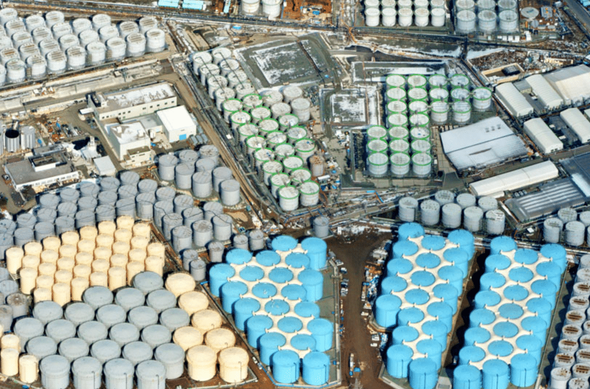hankyoreh
Links to other country sites 다른 나라 사이트 링크
Japan says it briefed foreign diplomats on Fukushima’s contaminated water at Foreign Ministry

The Japanese government announced that it had invited diplomats in Tokyo to its Foreign Ministry for a briefing on the current situation regarding contaminated water from the Fukushima Daiichi Nuclear Power Plant disaster. While it has held 103 such briefings to date, this was the first announcement about one.
“Since the start [of the briefings], we have continued to provide information to diplomats in Tokyo about conditions at the Fukushima Daiichi Nuclear Power Plant since the East Japan earthquake,” the ministry explained on Sept. 4.
“This was the 103rd briefing, and we explained about how Japan has taken advantage of opportunities with international conferences of the IAEA and others to swiftly and proactively transmit information,” it continued. The briefing was attended by diplomats from 22 countries and regions around the world, including South Korea and Taiwan.
The Japanese government’s unusual move in announcing the event is being seen as a reflection of recent concerns being raised by Seoul over contaminated water from the Fukushima Daiichi Nuclear Power Plant.
The continued contamination of water with radioactivity has remained a problem since underground water entered the Fukushima Daiichi Nuclear Power Plant, which suffered a disaster on Mar. 11, 2011. The Tokyo Electric Power Company (TEPCO), which operates the plant, has used a radioactive material removal system known as ALPS (multi-nuclide removal system) to treat the contaminated water. According to the Japanese government, ALPS has been used to clean the water of 62 types of radioactive material, not including tritium (a hydrogen isotope that shares many properties with regular hydrogen). Contaminated water that has been treated with ALPS is being stored in tanks on the Fukushima Daiichi site.
The problem is that the amount of contaminated water being stored reached 1.12 million tons early this year, while site issues mean that the limits of tank storage could be reached within just a few years. For that reason, the Japanese government is pushing to have the water released into the sea. But based on an investigation of 890,000 tons of Fukushima Daiichi water that had undergone ALPS purification (950,000 tons total), TEPCO announced in September 2018 that 750,000 tons – more than 80% – still included radioactive material above emission standards. Fukushima-area fishers continue to oppose the release of Fukushima Daiichi water in the ocean on that basis, and the Japanese government has yet to proceed with the discharge.
By Cho Ki-weon, Tokyo correspondent
Please direct comments or questions to [english@hani.co.kr]
Caption: Storage tanks for contaminated water from the Fukushima nuclear power plant in 2017. (photo pool)

Editorial・opinion
![[Editorial] Intensifying US-China rivalry means Seoul must address uncertainty with Beijing sooner than later [Editorial] Intensifying US-China rivalry means Seoul must address uncertainty with Beijing sooner than later](https://flexible.img.hani.co.kr/flexible/normal/500/300/imgdb/original/2024/0517/8117159322045222.jpg) [Editorial] Intensifying US-China rivalry means Seoul must address uncertainty with Beijing sooner than later
[Editorial] Intensifying US-China rivalry means Seoul must address uncertainty with Beijing sooner than later![[Column] When ‘fairness’ means hate and violence [Column] When ‘fairness’ means hate and violence](https://flexible.img.hani.co.kr/flexible/normal/500/300/imgdb/original/2024/0516/7417158465908824.jpg) [Column] When ‘fairness’ means hate and violence
[Column] When ‘fairness’ means hate and violence- [Editorial] Yoon must stop abusing authority to shield himself from investigation
- [Column] US troop withdrawal from Korea could be the Acheson Line all over
- [Column] How to win back readers who’ve turned to YouTube for news
- [Column] Welcome to the president’s pity party
- [Editorial] Korea must respond firmly to Japan’s attempt to usurp Line
- [Editorial] Transfers of prosecutors investigating Korea’s first lady send chilling message
- [Column] Will Seoul’s ties with Moscow really recover on their own?
- [Column] Samsung’s ‘lost decade’ and Lee Jae-yong’s mismatched chopsticks
Most viewed articles
- 1Celine Song says she’s gratified global audiences have responded to the kismet of ‘inyeon’
- 2[Editorial] Transfers of prosecutors investigating Korea’s first lady send chilling message
- 3[Exclusive] Unearthed memo suggests Gwangju Uprising missing may have been cremated
- 4[Column] US troop withdrawal from Korea could be the Acheson Line all over
- 5For new generation of Chinese artists, discontent is disobedience
- 6Xi, Putin ‘oppose acts of military intimidation’ against N. Korea by US in joint statement
- 7Highly educated high-earners at risk of being replaced by AI, BOK study says
- 8Could Korea’s Naver lose control of Line to Japan?
- 9[Editorial] Intensifying US-China rivalry means Seoul must address uncertainty with Beijing sooner t
- 10Japan begins dumping irradiated Fukushima water amid outpouring of concern about vague timeline